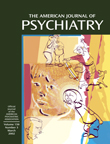Are Subjects in Pharmacological Treatment Trials of Depression Representative of Patients in Routine Clinical Practice?
Abstract
OBJECTIVE: The methods used to evaluate the efficacy of antidepressants differ from treatment for depression in routine clinical practice. The rigorous inclusion/exclusion criteria used to select subjects for participation in efficacy studies potentially limit the generalizability of these trials’ results. It is unknown how much impact these criteria have on the representativeness of subjects in efficacy trials. This study estimated the proportion of depressed patients treated in routine clinical practice who would meet standard inclusion/exclusion criteria for an efficacy trial. METHOD: A total of 803 individuals, aged 16–65 years, who were seen at intake at an outpatient practice underwent a thorough diagnostic evaluation, including the administration of semistructured diagnostic interviews; 346 patients had current major depression. Common inclusion/exclusion criteria used in efficacy studies of antidepressants were applied to the depressed patients to determine how many would have qualified for an efficacy trial. RESULTS: Approximately one-sixth of the 346 depressed patients would have been excluded from an efficacy trial because they had a bipolar or psychotic subtype of depression. The presence of a comorbid anxiety or substance use disorder, insufficient severity of depressive symptoms, or current suicidal ideation would have excluded 86.0% (N=252) of the remaining 293 outpatients with nonpsychotic unipolar major depressive disorder from an antidepressant efficacy trial. CONCLUSIONS: Subjects treated in antidepressant trials represent a minority of patients treated for major depression in routine clinical practice. These results show that antidepressant efficacy trials tend to evaluate a subset of depressed individuals with a specific clinical profile.



